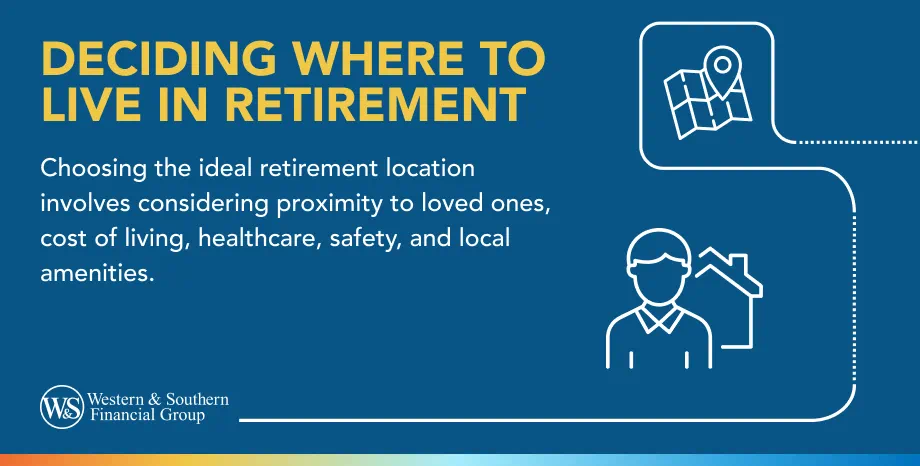

Table of Contents
Key Takeaways
- Consider family proximity, cost of living, activities, healthcare, and taxes.
- Climate preference and lifestyle play crucial roles in retirement location.
- Safety, air quality, and local amenities impact quality of life.
If you're nearing retirement, you might be considering how your lifestyle may change. A big part of this is deciding where you'll live in retirement. This might not be an easy choice, and it could involve moving away from a place you know and love. What's more, where you decide to spend your retirement years could affect your finances.
As you start to plan your future, here's what to consider when deciding where to live in retirement.
Determine Why You're Relocating
If you're thinking about relocating for retirement, make sure to consider why that's the best decision for you. Common reasons people relocate in retirement include:
- Proximity to loved ones: If your children or relatives live in another state, you might want to relocate so you can spend more time with them. Living nearby could improve your quality of life and save on travel costs.
- Work & activities: A major factor in your decision is how you'll be spending your time in retirement. Will you be working part time to boost your retirement income or are you interested in learning new skills and expanding your social network? Or will you start a new routine? To narrow down your options for moving, envision what your regular activities will be during retirement.
- A lower cost of living: If you're moving from a large city to a smaller one with an overall lower cost of living, your dollar could stretch further. Besides housing and food, you'll want to account for the costs of health care and taxes.
- Reduced housing expenses: If you are thinking of selling your home and moving to a smaller home or renting, your housing expenses could drop dramatically. And if you sell your home and rent another property, you could consider downsizing to make your housing more affordable.
- Your spouse's retirement: Will you and your spouse be retiring at the same time? Or will you be retiring at different times? Both cases could influence your decision on whether to relocate during retirement.
- Retirement savings: When you retire, your lifestyle will greatly depend on your retirement savings. As you determine the best place for you to live, make sure you can afford it.
Consider These Important Factors
When you're deciding where to live in retirement, the following factors could help you find the right state for you and your family:
- Better health care facilities: If your medical needs change, you might want to move to an area with highly rated health care facilities. How is the quality and availability of health care in the new city you're thinking of moving to?
- Taxes: How will moving to another state affect your taxes? Does the state have lower state, local, property or sales tax than your current state does? Is there a tax on pension or retirement plan distributions? Taxes could help you determine the best states to retire in.
- Cultural vitality: If you yearn to enjoy arts and culture during your retirement, what is the scene like for entertainment and music? Will you be living close to museums?
- Crime: What is the crime rate where you're considering moving to? Will you feel safe in your new neighborhood?
- Weather: Are you a snowbird, or do you and your spouse prefer warmer weather year-round? Determine your ideal climate and how the weather will affect your living expenses. For instance, if you're considering living somewhere warmer, you could expect to spend more on air conditioning. Conversely, in colder areas you could be spending more on heating.
- Air quality: Air pollution can cause serious health problems. And if you're already suffering from an ailment that can be exacerbated by poor air quality, it's a good idea to avoid locations with heavy air pollution.
- Walkability & bikeability: If you plan to be active during your golden years, how easy is it to walk to the grocery store and nearby parks and local attractions? Are there well-maintained bike paths? Walking and biking more could also save on transportation costs. If you and your spouse plan to work part time, you should also consider the average commute times in the new cities you're considering moving to.
The Bottom Line
As you can see, there's no one-size-fits-all approach. The best place to retire largely depends on your needs and preferences. By weighing these different factors, you might have an easier time determining whether to relocate and where to move.















